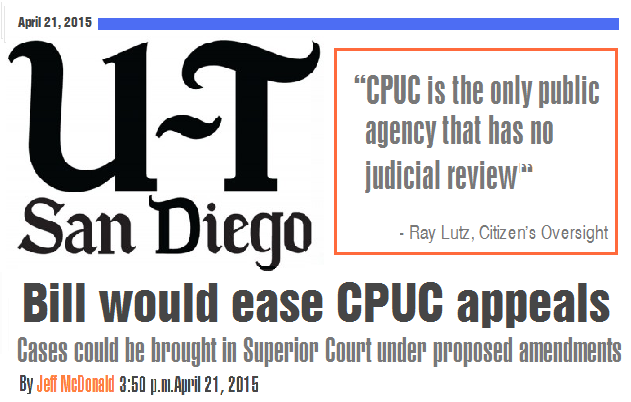Anthony Rendon Introduces Bill Prompted By Aguirre & Severson Court Action
Click here to read this story on the U~T San Diego Web site

Bill Would Ease CPUC Appeals
Cases Could Be Brought In Superior Court Under Proposed Amendments
By Jeff McDonald3:50 p.m.April 21, 2015
The chairman of the California Assembly committee that oversees utility companies and their regulators wants to make it easier for consumers to challenge actions such as the settlement deal that assigned customers most of the cost for premature shutdown of the San Onofre nuclear plant.
Anthony Rendon, D-Lakewood, announced proposals Monday that would allow legal challenges to California Public Utilities Commission rulings to be heard in Superior Court. Current law requires plaintiffs to take their case to an appellate court, which may or may not take up the case.
“Everyone deserves the right to their day in court,” Rendon said in a statement. “No government entity, including the CPUC, should be able to make unilateral rulings without being subject to a fair and transparent appeal process.”
The proposed legislation also would create an inspector general and public adviser to oversee specific commission practices.
The inspector general would be an independent entity appointed by the state auditor that would have authority to investigate the commission. Agencies including the California Energy Commission and the State Water Resources Control Board already have inspectors general.
The public adviser would work within the utilities commission to promote transparency by posting details about power contracts and rate-hike applications, among other information.
The issue of taking commission complaints to court made headlines last week, when a federal judge dismissed a lawsuit the consumer group Citizens Oversight filed against the commission and San Onofre majority owner Southern California Edison.
Without ruling on the merits of the allegation that the San Onofre settlement was unfair in charging ratepayers $3.3 billion, U.S. District Court Judge Cathy Ann Bencivengo told plaintiffs their claim belonged in state court.
Current rules only require that appellate judges consider taking the case – an option Ray Lutz of Citizens Oversight said robs consumers of their due-process rights.
“This is the only public agency that has no judicial review. It’s been a huge problem,” Lutz said. “If we have judicial review, then these cases that have foundered will have a place to go. The trouble is it may take a very long time to turn the corner. It doesn’t go back and fix what just happened.”
Donald Kelly of the Utility Consumers’ Action Network said the legislation may create more problems than it solves because most judges lack expertise in utility cases, which can have dozens of stakeholders.
He also noted that language in the bill does not spell out how courts will manage such cases.
“The way we currently have the appellate structure for commission cases is a good thing,” Kelly said. “I’m open to having a discussion, but if you’re going to tinker with appellate review of commission’s decisions, you need to be extremely careful.”
A U.S. Supreme Court decision issued Tuesday may have some bearing on the Rendon legislation.
By a 7-2 vote, the court said commercial customers in Wisconsin, Kansas and elsewhere could sue energy companies in state court for damages they sustained during the historic run-up in California electricity prices in 2001, when their costs also spiked.
Energy companies argued that federal law precluded the case from being heard in state court.
Former utilities commission President Loretta Lynch said the Rendon legislation “dovetails quite nicely” with the high court ruling. She said the commission’s investigation into alleged price-fixing was halted once she left the panel.
“That investigation had substantial evidence of this exact problem and as soon as I left, the PUC ducked,” Lynch said. “These guys didn’t. And 15 years later, they’re going to get their day in court. California had the evidence and they didn’t use it.”
Rendon that U-T San Diego coverage of the San Onofre settlement suggested to him that the bill is needed, referencing a report earlier this month showing that much of the deal was formed during a secret meeting in Poland more than two years ago.
The meeting between former commission President Michael Peevey and a Southern California Edison executive at the Hotel Bristol in Warsaw is part of unrelated criminal investigations into favoritism and other commission practices being conducted by state and federal prosecutors. The commission is reviewing whether to sanction Edison for its two-years-late disclosure of the meeting.
“The activities of the CPUC have been hidden under a shroud of secrecy that needs to be lifted,” Rendon said. “The proposed reforms serve as a step toward restoring the CPUC’s accountability to the public.”
The bill is scheduled to be heard in the Judiciary Committee next week and then in the Appropriations Committee. If it passes the Assembly, it would head to the Senate in June.
© Copyright 2015 The San Diego Union-Tribune, LLC. An MLIM LLC Company. All rights reserved.

